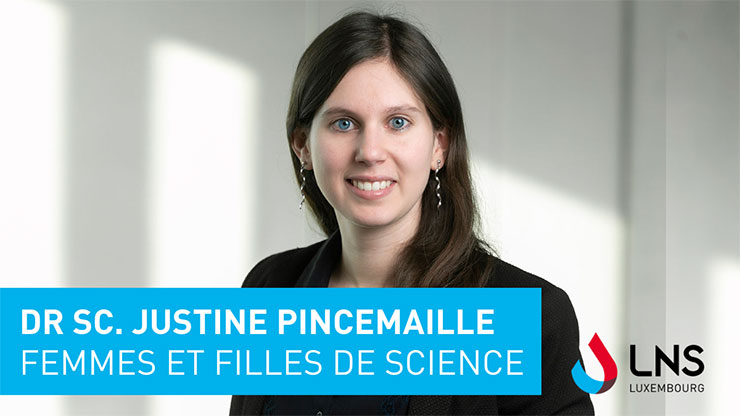- The Laboratory
- Organization
- Departments
- Jobs
- Analysis book
- Contact
- News
- Publications
- Download



Within the framework of the International Day of Women and Girls in Science, we have the pleasure to present you representatives of this female excellence at the LNS, who give us an insight into their work in the following three interviews, telling us what is particularly important to them in their field and how they see the role of women in science. Here the profile of Dr sc. Justine Pincemaille has been working as a technical officer in the Food Monitoring Service of the Department of Health Protection at the Laboratoire national de santé since 2019.
In 2013 following my bachelor’s degree, after many and insistent phone calls, I secured an internship in the LNS’ Food Chemistry Service in Luxembourg City (currently known as the Food Monitoring). I was Dr sc. Claude Schummer’s first trainee following his arrival at the LNS. He introduced me to research, and continuing my studies to obtain my PhD in food physical chemistry in 2018 was a no-brainer as it allowed me to pursue this path. In the middle of a post-doctorate on the recovery of industrial food waste by chemical treatment, I spotted a job offer at the LNS. Despite my tender age of 26 years old, I hedged my bets and applied for the position of manager in the Food Monitoring Service. To my surprise, I officially joined the team in August 2019 and found colleagues and a job I knew I would grow with.
I was hired as a pesticide technical officer, but I also quickly began working on additives, such as food colours and plant toxins. Together with Dr sc. Claude Schummer, I also manage all our analytical equipment, which consists of around 15 state-of-the-art instruments. My job is to supervise the technicians in their routine analysis and to help them with analytical problems. We carry out microbiological and chemical measurements (GMOs, moulds, pesticides, additives, mycotoxins, materials in contact, etc.) of foodstuffs from all over Luxembourg and from third-party countries. As our laboratory is the national reference laboratory in about ten fields, it is necessary for me to set up new analytical methods (protocols) in order to be able to meet the demands of the European reference laboratories. This involves carrying out new procedures directly “on the bench”. In addition to the management skills required for this job, my work also involves work in the laboratory – I am still primarily a researcher.
I enjoyed discovering the scientific diversity that this field offers and that we don’t necessarily think about. Food science is a vast domain covering microbiology, biochemistry, chemistry, physics, etc. It is this diversity that made me choose this field, this diversity that attracted me and above all the desire to protect and better inform the consumer. This is only possible with a good knowledge of foodstuffs. Food is a very topical subject, very controversial in the media, and we must not forget that as long as there are human beings walking the earth, there will be a need to feed them. The objective is to ensure this by combining safety and pleasure, which is why I chose this field.
There are still differences between male and female colleagues. Unfortunately, this difference isn’t unique to science and affects all fields. There are still salary differences between men and women, and it is often women who reduce their working hours due to pregnancy. This can discredit them or put a brake on their career. However, just because we are women does not mean we cannot make major scientific advances. Men sometimes forget that it were women such as Marie Curie, Rosalind Franklin and Lise Meitner who made the great discoveries without which we would not be here today. Women definitely seem to be as much a part of science as men.
I think it is pretentious to say that women are better scientists than men. A scientist is a scientist first and foremost. Perhaps it can be said that women bring a more rigorous, methodical, and organised side than men. They question themselves and their work perhaps more than men. Women seem to be more complementary to men. So, I think that mixed teamwork can be a major asset in a department. Women are not necessarily better, but they definitely have the capacity and skills to significantly contribute to the scientific world.